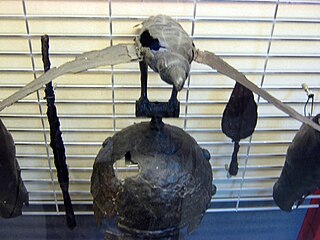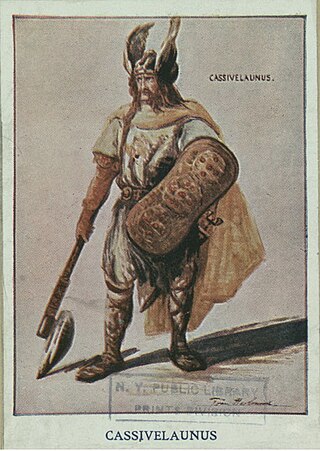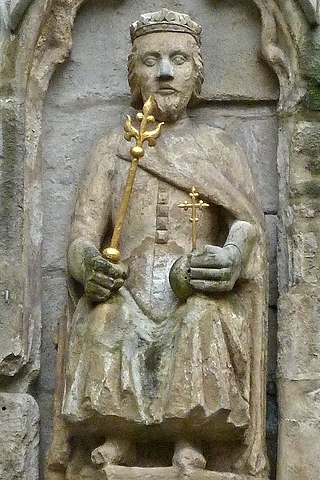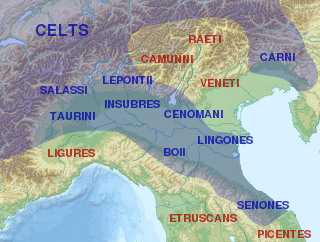
Magnus Maximus was Roman emperor in the West from 383 to 388. He usurped the throne from emperor Gratian.
Year 121 BC was a year of the pre-Julian Roman calendar. At the time it was known as the Year of the Consulship of Opimius and Allobrogicus and the Second Year of Yuanshou. The denomination 121 BC for this year has been used since the early medieval period, when the Anno Domini calendar era became the prevalent method in Europe for naming years.

The Gallic Wars were waged between 58 and 50 BC by the Roman general Julius Caesar against the peoples of Gaul. Gallic, Germanic, and Brittonic tribes fought to defend their homelands against an aggressive Roman campaign. The Wars culminated in the decisive Battle of Alesia in 52 BC, in which a complete Roman victory resulted in the expansion of the Roman Republic over the whole of Gaul. Though the collective Gallic armies were as strong as the Roman forces, the Gallic tribes' internal divisions eased victory for Caesar. Gallic chieftain Vercingetorix's attempt to unite the Gauls under a single banner came too late. Caesar portrayed the invasion as being a preemptive and defensive action, but historians agree that he fought the wars primarily to boost his political career and to pay off his debts. Still, Gaul was of significant military importance to the Romans. Native tribes in the region, both Gallic and Germanic, had attacked Rome several times. Conquering Gaul allowed Rome to secure the natural border of the river Rhine.

Lucius Junius Brutus was the semi-legendary founder of the Roman Republic, and traditionally one of its first consuls in 509 BC. He was reputedly responsible for the expulsion of his uncle the Roman king Tarquinius Superbus after the suicide of Lucretia, which led to the overthrow of the Roman monarchy. He was involved in the abdication of fellow consul Tarquinius Collatinus, and executed two of his sons for plotting the restoration of the Tarquins.

Brennus or Brennos is the name of two Gaulish chieftains, famous in ancient history:
The Allobroges were a Gallic people dwelling in a large territory between the Rhône river and the Alps during the Iron Age and the Roman period.

Cassivellaunus was a historical British military leader who led the defence against Julius Caesar's second expedition to Britain in 54 BC. He led an alliance of tribes against Roman forces, but eventually surrendered after his location was revealed to Julius Caesar by defeated Britons.

Belinus was a legendary king of the Britons, as recounted by Geoffrey of Monmouth. He was the son of Dunvallo Molmutius and brother of Brennius and came to power in 390 BC. He was probably named after the ancient god Belenus.

Historia regum Britanniae, originally called De gestis Britonum, is a pseudohistorical account of British history, written around 1136 by Geoffrey of Monmouth. It chronicles the lives of the kings of the Britons over the course of two thousand years, beginning with the Trojans founding the British nation and continuing until the Anglo-Saxons assumed control of much of Britain around the 7th century. It is one of the central pieces of the Matter of Britain.
Arvirargus or Arviragus was a legendary British king of the 1st century AD, possibly based upon a real person. A shadowy historical Arviragus is known only from a cryptic reference in a satirical poem by Juvenal, in which a giant turbot presented to the Roman emperor Domitian is said to be an omen that "you will capture some king, or Arviragus will fall from his British chariot-pole".

Dionotus was a legendary king of Cornwall in Geoffrey of Monmouth's Historia regum Britanniae, an account of the rulers of Britain based on ancient Welsh sources and disputed by many historians. Dionotus succeeding his brother Caradocus, and was regent of Britain during the campaigns in Gaul of Emperor Magnus Maximus. The curious thing about this king is that the Welsh chronicles, which parallel most of Geoffrey of Monmouth's book, do not mention this king by name. However, Geoffrey uses Latin versions of Welsh names so he could be referring to Dynod, duke of Cornwall, or Anwn Dynod, Maximus's own son.

The Battle of the Allia was fought c. 387 BC between the Senones – a Gallic tribe led by Brennus, who had invaded Northern Italy – and the Roman Republic.
Lucius Tiberius is a Western Roman procurator or emperor from Arthurian legend in which he is killed in a war against King Arthur. First appearing in Geoffrey of Monmouth's pseudo-historical work Historia Regum Britanniae, Lucius also features in later, particularly English literature such as the Alliterative Morte Arthure and Thomas Malory's Le Morte d'Arthur. The motif of a Roman Emperor defeated by Arthur is found in the Old French literature as well, notably in the Vulgate Cycle.
Mandubracius or Mandubratius was a king of the Trinovantes of south-eastern Britain in the 1st century BC.

The Battle of Placentia was fought in 194 BC, near Placentia, between the Roman Republic and the Boii. The Roman army won the battle. The following year, another battle with the Boii would take place in the same region; known as the Battle of Mutina, it would end the Boii threat.

In the course of his Gallic Wars, Julius Caesar invaded Britain twice: in 55 and 54 BC. On the first occasion, Caesar took with him only two legions, and achieved little beyond a landing on the coast of Kent. The second invasion consisted of 800 ships, five legions and 2,000 cavalry. The force was so imposing that the Celtic Britons did not contest Caesar's landing, waiting instead until he began to move inland. Caesar eventually penetrated into Middlesex and crossed the Thames, forcing the British warlord Cassivellaunus to pay tribute to Rome and setting up Mandubracius of the Trinovantes as a client king. The Romans then returned to Gaul without conquering any territory.

Over the course of nearly four centuries, the Roman Republic fought a series of wars against various Celtic tribes, whom they collectively described as Galli, or Gauls. Among the principal Gallic peoples described as antagonists by Greek and Roman writers were the Senones, Insubres, Boii, and Gaesatae.
Fuimus Troes is a verse drama attributed to Jasper Fisher about Julius Caesar's invasion of Britain in 55 BC. It was published in quarto in London, 1633. The drama is written in blank verse, interspersed with lyrics; Druids, poets, and a harper are introduced, and it ends with a masque and chorus.
The Battle of Vindalium took place near Vindalium, a Cavarian settlement probably corresponding to modern day Mourre-de-Sève in Sorgues, near the confluence of the Rhône and Durance rivers in Southern France. The battle opposed the Allobroges, a Gallic tribe dwelling further north between the Rhône and the Alps, to the Roman forces of proconsul Gnaeus Domitius Ahenobarbus.













